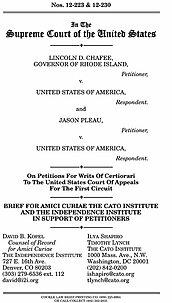Chafee v. United States and Pleau v. United States
Learn more about Cato’s Amicus Briefs Program.
The Interstate Agreement on Detainers, a compact authorized by federal statute, provides a simple procedure for transferring custody of prisoners between states. Because the federal government annually seeks to prosecute thousands of prisoners already in state custody, it joined the IAD in 1970 to get the benefit of this unified procedure. When it joined, it did so as a “state” for purposes of the agreement, and exempted itself from only two provisions (which aren’t relevant to this case). One of the provisions that the federal government decided not to exempt itself from, Article IV(a), allows the governor of the sending state to deny any request made by a receiving state to transfer a prisoner. In September of 2010, Jason Pleau offered to plead guilty to robbery and murder charges in Rhode Island in exchange for life in prison without parole, the harshest sentence state law allows. Pleau’s crimes also allegedly violated federal law, however, and the U.S. government wanted to prosecute Pleau itself in order to seek the death penalty. The government thus sought custody through the IAD by filing for the little-known writ of habeas corpus ad prosequendum (“show me the body for prosecution”). The governor of Rhode Island, Lincoln Chafee, disapproves of the death penalty and used his authority under the IAD’s Article IV(a) to deny the federal request. A federal district court, later affirmed by the U.S. Court of Appeals for the First Circuit, overruled Chafee’s denial, stating that the Supremacy Clause prevented the governor from interfering with the federal government’s wishes. The First Circuit found that the compact’s specific text and the normal canons of statutory construction were “all beside the point.” According to the court, what was important was that Congress could not possibly have meant to grant state governors the power to deny federal transfer requests—and thus the IAD didn’t affect the balance of power between the federal government and the states. The First Circuit thus granted the writ, and Pleau is now in federal custody. The question presented in this case, whether the Supremacy Clause trumps a governor’s right to deny a request for transfer of custody under the IAD, raises two important issues: First, if the First Circuit is right, then the federal government may reap the benefit of interstate bargains without having to fulfill its own obligations under them. Second, the First Circuit’s opinion effectively treats the state courts as inferior to the federal courts, which upsets the system of concurrent sovereignty that the Founders designed. Cato has joined the Independence Institute to file an amicus brief urging the U.S. Supreme Court to hear this case, with a focus on the second issue. We argue that the U.S. legal system has always recognized the dual sovereignty of federal and state courts, dating back to Chief Justice John Marshall. As Chief Justice Marshall explained, that dual system requires that state courts not be considered inferior to federal courts, and thus federal courts have no independent authority to order prisoners under state jurisdiction to be transferred to the federal system. Furthermore, when abrogating state sovereignty via the Supremacy Clause, Congress must demonstrate its intent to do so with “unmistakably clear language”—and none of the statutes applicable here contain any such language. Finally, we argue that the First Circuit has misinterpreted relevant Supreme Court precedent and that a proper reading of the relevant case law would establish that a state is well within its rights to treat the federal government like any other state under the IAD and deny its request to transfer a prisoner into federal custody.

This work is licensed under a Creative Commons Attribution-NonCommercial-ShareAlike 4.0 International License.



